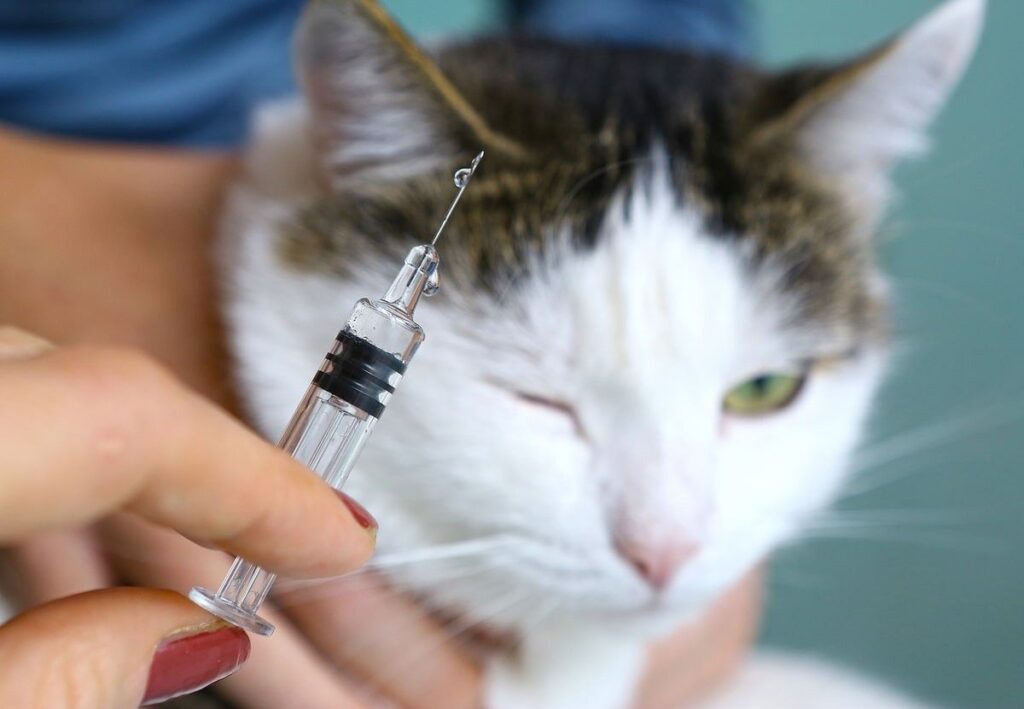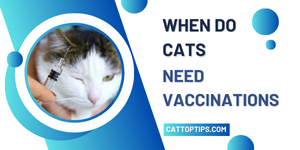Vaccinations are one of the best ways to keep your cat healthy. Vaccines protect cats from many dangerous diseases that they might encounter both inside and outside the home. If you’re a cat owner, you probably have questions about when your cat needs vaccines, what types are essential, and when it’s safe for them to go outside.
In this guide, we’ll look at when kittens and adult cats need vaccinations, why these vaccines are so important, and what to expect after each shot. By understanding these basics, you’ll feel confident about keeping your feline friend safe and healthy.

1. When Do Kittens Need Vaccinations?
Kittens are usually born with some immunity, passed down from their mothers. However, this protection doesn’t last forever, and kittens soon need vaccinations to stay healthy.
Here’s a basic schedule for kitten vaccinations:
- 6-8 Weeks Old: This is typically the age when kittens start their vaccinations. They’ll get a vaccine called FVRCP, which covers three major diseases: feline viral rhinotracheitis, calicivirus, and panleukopenia.
- 10-12 Weeks Old: Kittens get another FVRCP shot to strengthen their immunity. This is also the time when some kittens may get a vaccine for FeLV, or feline leukemia, especially if they are likely to spend time outdoors.
- 14-16 Weeks Old: At this stage, kittens get their final FVRCP booster and usually their first rabies vaccine. Rabies shots are essential and often required by law in many areas.
These early vaccinations set a foundation for a healthy immune system that can protect your cat throughout its life.
2. When Do Adult Cats Need Vaccinations?
While kittens need multiple shots in their first few months, adult cats require fewer vaccines. However, they still need some vaccinations to keep their immunity strong.
For adult cats, the typical vaccination schedule looks like this:
- Annual or Triennial Boosters: Most cats need booster shots for the FVRCP and rabies vaccines either every year or every three years, depending on the specific vaccine. Your vet can tell you what’s best based on your cat’s needs and local laws.
- Optional Vaccines: Some adult cats, particularly those who go outside or are around other animals, might need additional vaccines like FeLV. If your cat stays strictly indoors, they may not need as many vaccines, but your vet can guide you on this.
- It’s important to take your cat for regular vet check-ups. This helps you stay on top of vaccination schedules and ensures that your cat remains healthy as it grows older.
3. Why Are Vaccinations Important for Cats?
Vaccinations protect cats from serious, contagious diseases. Even indoor cats can benefit from vaccines, as some illnesses can be brought into the home accidentally. Here’s a look at some key vaccines and why they matter:
- FVRCP Vaccine: This vaccine protects against three diseases: feline viral rhinotracheitis (a respiratory virus), calicivirus (another respiratory disease), and panleukopenia (also called feline distemper). Panleukopenia, in particular, can be life-threatening.
- Rabies Vaccine: Rabies is a deadly virus that can spread from animals to people. Because of the risks, most places legally require cats to get a rabies shot.
- FeLV (Feline Leukemia Virus) Vaccine: FeLV weakens a cat’s immune system and makes them more vulnerable to other infections. Cats who spend time outdoors or around other cats are at higher risk for FeLV, so this vaccine is often recommended for them.
- Vaccinations reduce the chances of these diseases spreading and keep your cat from suffering preventable health issues.
4. When Can My Cat Go Outside After Vaccination?
If you want to let your cat outside, it’s essential to know that vaccines take a bit of time to start working. Usually, vaccines become effective within 5 to 14 days after they are given. For this reason, waiting for about two weeks after vaccination is best before letting your cat explore the outdoors.
For kittens, it’s even more important to wait until they complete their full set of vaccinations, typically around 16 weeks old. This ensures they’re fully protected before they face the outdoor environment.
If your adult cat gets a booster shot, it’s generally safe to let them outside after a few days, but check with your vet if you’re unsure.
5. When Can Kittens Go Outside After Vaccinations?
Kittens are naturally curious, and many owners want to let them explore outside. However, kittens should only go outside once they’re fully vaccinated and have developed a strong immune response.
Generally, it’s safest to let kittens go outside after 16 weeks of age, or once they’ve completed all core vaccinations. This timeline helps ensure they’re well-protected from viruses and bacteria they may encounter outside.
For added safety, some owners prefer to wait until their kitten is spayed or neutered before allowing outdoor exploration. This can help reduce roaming tendencies and minimize the risk of accidents or encounters with other animals.
6. Keeping Your Cat on a Healthy Vaccination Routine
Vaccinations are only part of keeping your cat healthy. A good schedule and regular visits to the vet also matter. Here are some tips to make sure your cat stays on track:
- Yearly Vet Visits: Routine check-ups help you stay on top of vaccinations and other aspects of your cat’s health.
- Keep a Vaccination Record: Tracking vaccinations is important. It’s useful to have a record if you need to board your cat or if you ever move.
- Plan for Core Vaccines: Ensure your cat gets the core vaccines like FVRCP and rabies. If your cat’s lifestyle changes, ask your vet about adding or updating vaccinations.
By keeping a regular schedule, you’re helping your cat stay protected over the long term.
7. Costs and Planning for Vaccinations
The cost of vaccinations can vary. Initial shots for kittens might cost around $50 to $100 per vet visit, depending on where you live and your vet’s fees. Some vets offer package deals that cover a kitten’s full series of vaccinations, which can be a good way to save.
For adult cats, budgeting for an annual vet visit is helpful. Remember, vaccines can prevent costly treatments for diseases down the line, so they’re worth the investment.
Conclusion
Vaccinations are a crucial part of keeping your cat healthy, safe, and happy. They’re especially important for kittens, who need a full series of shots during their early months. Adult cats, too, need regular boosters to stay protected against serious diseases.
If you’re ever unsure about your cat’s vaccination schedule, ask your vet for advice. They can recommend which vaccines are essential and how often your cat needs them. By following a vaccination schedule and providing regular check-ups, you’ll be giving your furry friend the best chance for a long, healthy life.
For more advice on keeping your cat happy and healthy, check out cattoptips for articles, tips, and resources on cat care.


